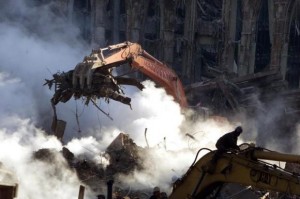
A crane lifts rubble from the ruins of the World Trade Center in New York, October 12, 2001. Smoke continues to pour from ground zero over a month after the collapse of the towers after being struck by hijackedaircraft.
Credit: Reuters/Brad Rickerby
NEW YORK
(Reuters) – A federal appeals court in New York has revived claims by 211 cleanup workers who sought compensation for their alleged exposure to toxic contaminants in buildings near the World Trade Center site after the Sept. 11, 2001, attacks.
The 2nd U.S. Circuit Court of Appeals on Thursday said a lower court judge erred in dismissing the claims, after the workers had answered “none” when asked if they had been “diagnosed” with ailments, injuries or diseases.
These workers were employed by cleaning companies hired by Verizon Communications Inc, Brookfield Properties and dozens of other owners of downtown Manhattan buildings damaged or destroyed in the attacks, the court said.
“The fact that plaintiffs answered ‘none’ to the interrogatory was an insufficient basis, by itself, for a blanket conclusion that all 211 plaintiffs could not establish their claims against defendants as a matter of law,” Circuit Judge Denny Chin wrote for a three-judge 2nd Circuit panel.
Thursday’s decision overturned an August 2012 dismissal of the claims by U.S. District Judge Alvin Hellerstein in Manhattan, who oversees much of the Sept. 11 litigation.
Verizon spokesman Bob Varettoni had no immediate comment. Lawyers for the phone company and the other defendants did not immediately respond to requests for comment.
“I applaud the 2nd Circuit for having the ability and desire to do the right thing,” Marc Bern, a lawyer for the workers, said in a phone interview. “It is clear that the exposures that these individuals had led to their injuries.”
The 2nd Circuit said Hellerstein should have examined whether each plaintiff suffered a compensable injury, even if it had been undiagnosed or surfaced late.
It also gave examples of workers who reported no diagnosed symptoms but deserved a chance to press their claims.
One complained of dizziness, fatigue and shortness of breath but received no diagnosis when he saw a doctor, while a second reported bronchitis, chronic coughing and difficulty breathing.
“While we appreciate that the sheer number of cases before the district court made its task of managing this mass tort litigation extraordinarily difficult, the district court was obligated to individually consider each plaintiff’s answer of ‘none’ in the context of any other evidence of injury,” Chin wrote.
The 2nd Circuit also upheld Hellerstein’s dismissal of claims by 31 workers who did not timely pursue their cases.
The case is Markut et al v. Verizon New York Inc et al, 2nd U.S. Circuit Court of Appeals, Nos. 12-3403 and 12-3729.
(Reporting by Jonathan Stempel in New York; editing by Gunna Dickson)








